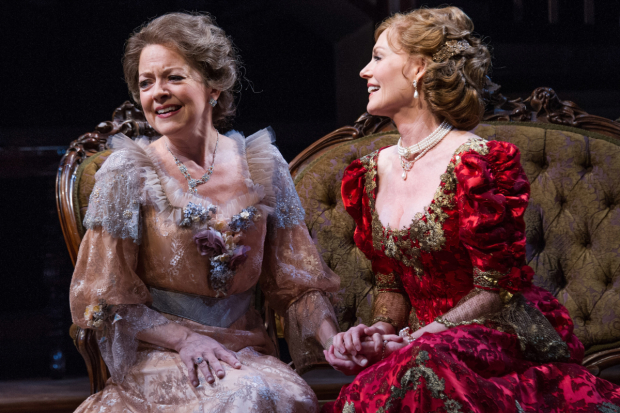The Little Foxes

(© C. Stanley Photography)
Arena Stage has just opened an energetic, beautifully articulated production of The Little Foxes, Lillian Hellman's play that takes place in a small town in the South in 1900. The Little Foxes has always been recognized for its criticism of predatory capitalism and for showing how a single family can contain some of the ugliest human traits of all time: greed, corruption, jealousy, and hate. But this production is not simply a landscape of evil.
The characters in question belong to the Hubbard family. Brothers Benjamin and Oscar want to build a cotton mill, but they need an additional $75,000. They approach their sister, Regina, married to the wealthy Horace Giddens, who is confined to a wheelchair because of a heart problem. Oscar initially proposes marriage between his son, Leo, and Regina's daughter, Alexandra, in order to get access to Horace's money. But since Alexandra and Leo are first cousins, Alexandra is horrified by the thought.
The brothers then urge Regina to ask Horace directly for the money. Horace refuses. Ultimately Leo, who is a bank teller, is pressured into stealing Horace's railroad bonds from his safety deposit box. When Horace realizes that the bonds have been stolen, he threatens to change his will, leaving everything to his daughter. But as he makes this threat, Regina makes it clear that she will reign supreme and blackmail her brothers into giving her control over the new venture.
The only characters with redeeming qualities in the play are Horace, Alexandra (a principled, generous young woman disgusted by her mother's avarice), and Birdie (a sweet woman who was tricked into marrying Leo so he could gain control over her father's cotton plantation). In smaller but critical roles, there are two African-American servants, Addie and Cal, who are devoted to Horace.
Television star Marg Helgenberger proves to be an excellent choice for the heartless Regina. She plays Regina as cold, calculating and anxious to find a new husband to replace Horace. She freely admits to Horace that she has contempt for him and hopes he dies soon. Jack Willis is a good match for Helgenberger's Regina. As Horace, Willis makes it clear that his daughter is the only relative he loves.
Edward Gero is powerful as the blustering, power-hungry Benjamin Hubbard, a man who is determined to get money wherever he can find it. He neatly represents the post-Civil War industrialists, who look forward hungrily to growing capital. Gregory Linington is equally good as Oscar Hubbard, a brute whose primary desire is for material gain. Stanton Nash's Leo is as corrupt as Oscar.
Isabel Keating is delightful as Birdie Hubbard, who drinks too much in order to ignore verbal and physical abuse from her husband. Megan Graves plays Alexandra as a charming girl who ultimately realizes just how heartless her mother can be. Kim James Bey is superior as Addie, the cook/housekeeper who would do anything for Horace, and David Emerson Toney is buoyant and funny as Horace's servant, Cal.
The Little Foxes is a meticulously crafted drama that could tip toward the melodramatic, but this production never does under the expert direction of Kyle Donelly, who keeps the piece serious but entertaining. The only element that doesn't ring true are some of the dialects, which seem to stray from all parts of the South.
Set designer Mikiko Suzuki Macadams has created a single set. Off to one side is the Giddens' home, showing a Victorian sofa, chairs, a piano, and a dining room table. Taking up the center of the stage is a sweeping wooden staircase that stretches from the first floor to the second. Costume designer Jess Goldstein clothes the women – Regina in particular – in elegant and colorful dresses. The men wear three-piece suits. Composer and sound designer Ryan Rumery's original compositions are quiet, moody, and very effective.
Clearly Lillian Hellman was looking to the future when she wrote The Little Foxes in 1939, addressing equality, income, race, and sexual identity. The most interesting element of this production is that, despite the fact that it is takes place in 1900, Regina is a woman who is very much ahead of her time and wants to be as financially powerful as her brothers. Meanwhile, it is Horace who wants to give money only to people who deserve it. All these issues are not far off from the ones we still grapple with today.











